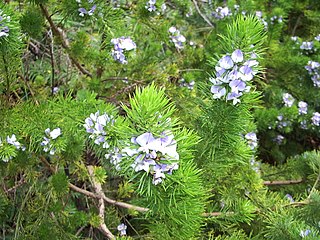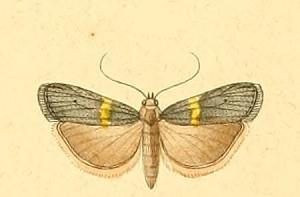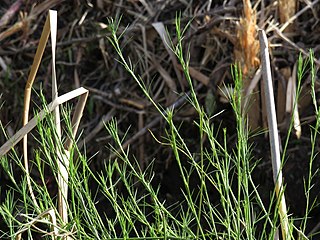
Psoralea is a genus in the legume family (Fabaceae) with over 60 closely related species native to southern Africa. In South Africa they are commonly referred to as fountainbush (English); fonteinbos, bloukeur, or penwortel (Afrikaans); and umHlonishwa (Zulu).

A tumbleweed is a structural part of the above-ground anatomy of a number of species of plants. It is a diaspore that, once mature and dry, detaches from its root or stem and rolls due to the force of the wind. In most such species, the tumbleweed is in effect the entire plant apart from the root system, but in other plants, a hollow fruit or inflorescence might detach instead. Xerophyte tumbleweed species occur most commonly in steppe and arid ecosystems, where frequent wind and the open environment permit rolling without prohibitive obstruction.

Psoralea esculenta, common name prairie turnip or timpsula, is an herbaceous perennial plant native to prairies and dry woodlands of central North America, which bears a starchy tuberous root edible as a root vegetable. The plant is also known as Pediomelum esculentum. English names for the plant include tipsin, teepsenee, breadroot, breadroot scurf pea, large Indian breadroot, prairie potato and pomme blanche. The prairie turnip was a staple food of the Plains Indians.

Otholobium is a genus of flowering plants in the pea family with over 50 named species, but several also remain undescribed sofar. Species may be herbaceous perennials, subshrubs, shrubs or small trees. The alternately set leaves are accompanied by stipules and mostly consist of three leaflets, sometimes just one. The inflorescences are on short or long stalks in the axils of the leaves. Within the inflorescences, the pea-like flowers occur in groups of three, rarely of two, subtended by a bract, and each individual flower also is subtended by a narrow bract. The petals may be white, pink, purple or blue, often with a differently colored nectar guide, that may sometimes even be yellow. The seedpods contain just one, black, dark or light brown seed. Most species are restricted to the Cape provinces of South Africa, but some occur at higher elevations in eastern Africa. Charles Stirton erected the genus in 1981. The species in South America will probably be segregated, because these are not sufficiently related to the African species.

Psoralea arborea is a species of legume in the family Fabaceae. It is found in South Africa.

Psoralea pinnata is an erect evergreen shrub or small tree that grows to a height between 1.5 metres (5 ft) and 4 metres (13 ft) tall.

Orbexilum, commonly called leather-root, is a genus of flowering plants in the legume family (Fabaceae). They are native to North America, where they are found in the United States and Mexico, south to Chiapas.

The tribe Psoraleeae is one of the subdivisions of the plant family Fabaceae. Recent phylogenetics has this tribe nested within tribe Phaseoleae.
Cullen plicatum, synonym Psoralea plicata, is a herb species in the genus Psoralea. It is native from northern Africa to north-west India and to South Africa.

Bituminaria bituminosa, the Arabian pea or pitch trefoil, is a perennial Mediterranean herb species in the genus Bituminaria.

Plicatin B is a hydroxycinnamic acid found in Psoralea plicata.

Plicatin A is a hydroxycinnamic acid found in Psoralea plicata.

Bakuchiol is a meroterpene in the class terpenophenol.

Oxybia is a monotypic snout moth genus described by Hans Rebel in 1901. Its only species, Oxybia transversella, was described by Philogène Auguste Joseph Duponchel in 1836. It is found in southern Europe and on the Canary Islands.
Bembecia albanensis is a moth of the family Sesiidae. It is found from most of Europe to Asia Minor and the Black Sea. It is also found in North Africa.

Psoralidin is a natural phenolic compound found in the seeds of Psoralea corylifolia.

Psoralea glandulosa is a herb species in the genus Psoralea found in Perú and Chile in South America and also in the United States.

Drupanol is a naturally occurring phenol that has been isolated from the seeds of Psoralea drupaceae. Although drupanol is sometimes said to be the same compound as bakuchiol, the two compounds are in fact distinct; they have the same molecular formula and weight but different chemical structures and hence are structural isomers. Bakuchiol has been found to possess antiandrogenic activity in vitro.

Psoralea fascicularis, the large-stipule fountainbush, is a species in the pea or Fabaceae family. It is endemic to the Western Cape province of South Africa where it has been red listed as endangered (EN) by the International Union for Conservation of Nature (IUCN) Red List of Threatened Species due to its declining population.

Psoralea cataracta is a species of flowering plant in the genus Psoralea. It was declared extinct in 2008 in the Red Data List of South African Plants, with a single specimen collected from the Tulbagh Waterfall in 1804. It was rediscovered 200 years later by Brian Du Preez in November of 2019 in the Winterhoek Mountains near Tulbagh. It is endemic to the Western Cape. It is also known by the name waterfall fountainbush.















